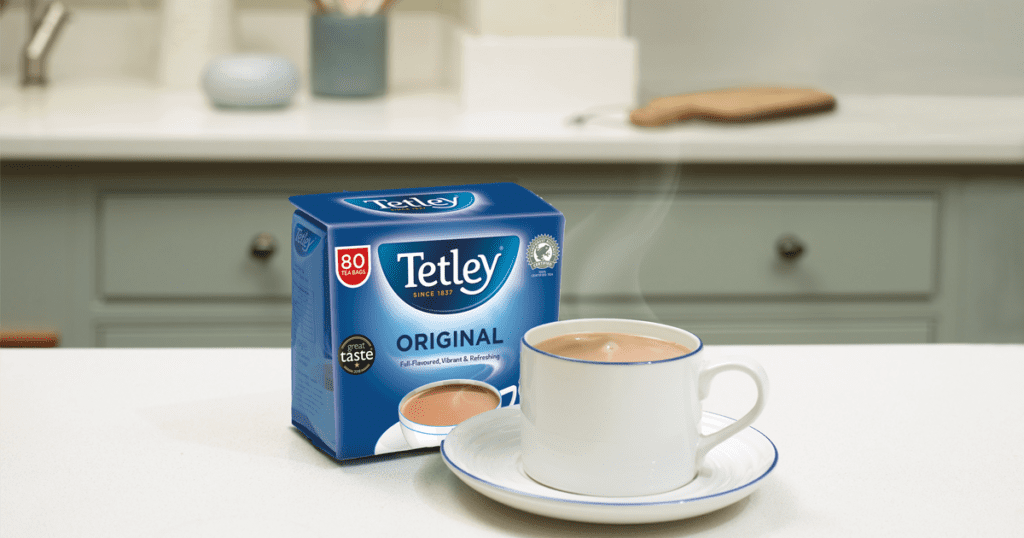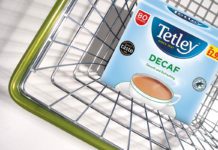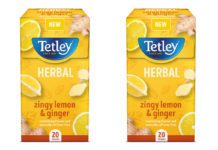
Tata Consumer Products offers its assessment of the UK tea category
SOME things have changed markedly over the last two years, but one thing remains a constant – Britain is a nation of tea drinkers.
Research from Tata Consumer Products, the firm behind Tetley, estimates that 100 million cups of tea are consumed across Britain each day – equivalent to 36 billion cups per year.
Far from being driven by a dedicated bunch of tea addicts, that high figure is instead achieved by the 70% of UK adults who say they drink tea every day. In terms of sales patterns within the category, the pandemic has made it more difficult to provide an accurate picture of the market.
However, Tata Consumer Products has reported year-on-year growth in both the frequency of purchase and spend per buy in the tea category, up 0.1% and 0.4% respectively.
The question then is, in such a well-developed category with extraordinary household penetration, how can Scotland’s c-store retailers extract even more from tea? According to Parminder Walia, category development manager at Tata Consumer Products, non-black tea is a subcategory that’s brimming with potential.
“The potential to increase sales beyond standard black is very real.
“In total market, non-black teas account for close to a quarter of all tea sales, whereas in impulse, non-black teas account for less than 10% of all tea sales,” she said.
The market share gap that exists for non-black teas in the convenience channel would seem to suggest there is scope for independent retailers to improve their offer.
However, with so many brands and styles of tea available, getting the offer right will be key and Walia suggested the secret is to pay close attention to customer demand.
“Understanding your customers and their preferences will dictate the range that you offer, but with changing lifestyles and people spending more time at home, reviewing what you sell is beneficial.
“Offering a variety of carefully chosen products and illustrating the occasions where the products fit will encourage shoppers to buy and return more often to shop,” she said.
In total market, non-black teas account for close to a quarter of all tea sales, whereas in impulse, they account for less than 10%.
Some convenience stores could potentially benefit from a bit more variety in their tea offer, but that doesn’t mean they should abandon well-known brands.
Walia said that retailers would be wise to remember that tea shoppers “like their brands.” She said: “87% of shoppers say brands are an important consideration when choosing what tea to buy, which is clear when you consider the top three tea brands in impulse account for 82.4% of total tea sales.”
When it comes to brand recognition, it doesn’t get much better than Tetley, Walia suggested, highlighting Kantar data for the year to 6 November 2021 which revealed Tetley has the highest number of buyers, level of household penetration, frequency of purchase, and spend per buyer in the category.
If expanding the tea offer through recognisable brands is the strategy, then increased average basket spend is the reward, according to Walia, who highlighted the value of tea shoppers to retailers.
“Research shows that tea shoppers are valuable shoppers and more likely to add other items to their basket. 45% include five or more items in their basket,” she said.
Tea shoppers aren’t just more valuable, those picking up fruit and herbal teas are also younger, as Walia explained.
“Particularly popular among 18-24 year-olds, higher value fruit and herbal teas are good to consider, with 39% regularly choosing herbal tea and 26% a fruity brew,” she said.
Walia recommended Tetley’s fruit and herbal range, which includes six flavours, as an ideal entry point for c-store retailers.
“Tetley’s new fruit and herbal range is helping stores to explore the opportunities in fruit and herbal.
“The range provides a familiar and safe pathway for shoppers to taste different teas, at a price point which offers a risk-free trial,” she said.
Putting care and attention into improving the non-black tea range may help retailers to secure some category growth, but it shouldn’t be done at the expense of the core black tea range. Standard black tea is still the category leader by some distance within Scottish convenience.
Walia offered some insight on just how strong standard black tea sales are, while also acknowledging the growth potential of green, fruit and herbal tea.
She said: “Standard black tea continues to dominate sales, but the Teltey survey also highlights opportunities for English Breakfast teas, with 53% saying English Breakfast was their favoured cup, followed by regular black (33%), green (17%), and fruit and herbals (16%).
“If you consider sales compared to two years ago, value growth in impulse can be seen in everyday black decaf up 26.5% and fruit and herbal up 18.7%.
“In total Scotland, everyday black decaf sales are up 3.8%, fruit and herbal by 0.7% and rooibos teas by 2.0%.”
















